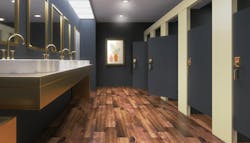Planning for Privacy and Accessibility in Public Restroom Design
Locking hardware can impact interior functionality in schools, health care and almost all settings. In addition, the right type of locking hardware can also support emerging design considerations for privacy in institutional, commercial and retail spaces. This is especially true for public restrooms.
While restrooms in commercial and retail occupancies must meet several operational considerations, leading designers are increasingly seeking ways for these spaces to contribute to a more positive occupant experience, including designing for wellness through improved privacy and accessibility. Locking hardware with visual indication trims can support these goals.
Designing commercial restrooms for improved privacy
In the design world, wellness refers to several interrelated approaches to the built environment that prioritize occupant safety, comfort, mental health and social well-being. It can be achieved by planning interiors with access to natural light or incorporating elements of biophilic design, which aims to connect people with nature in built environments. The specification of mindfully designed architectural products can also contribute to plans centered on occupant wellness.
As an example, locking hardware can support perimeter security goals, strengthen interior access control and promote an overall sense of safety for those inside a building. When this door component also has visual indication trims that clearly show the status of a door, it can contribute to occupant privacy as well. This can be particularly advantageous in retail settings such as cafes and restaurants.
For instance, single occupant restrooms can be secured with locking hardware that have visual indication trims. This locking hardware displays a door’s status to help sideline the need for other patrons to test the door to see if it is occupied. As a result, visual indication trims help maintain privacy for those inside the restroom and minimize time spent away from tables for those on the outside. In these applications, large indication windows that are visible from multiple angles within sight of the door can provide a more readable visual cue, even at a distance, to further support these goals.
Visual indication trims support accessible restroom design
Visual indication trims contribute to restroom design by improving both peace of mind and privacy because they display the room’s occupancy. When these types of locking hardware include components that fully comply with requirements listed in the Americans with Disability Act (ADA) standards they can also contribute to building accessibility.
For example, the ND Series from Schlage functions featuring push button locking that comply with International Code Council’s (ICC) A117.1-2017 Accessible and Usable Buildings and Facilities standard. This maintains accessible operation for a large range of abilities. Likewise, the ND Series, and all visual indication trim options from Schlage, offer the largest indication windows currently on the market for their respective lock types and utilize unmistakable red and white messaging. These features allow occupants to more easily see a door’s status. The locks also provide the strength, durability and versatility needed within a wide range of commercial applications. As such, Schlage locks with visual indication trims can help building professionals meet accessibility standards and improve occupant privacy and peace of mind.
Whether your project is new construction or a redesign, visual indication options are available to fit most application needs. Schlage‘s award-winning mortise and cylindrical options include kits for retrofitting existing locks to offer a cost-effective solution for meeting current design opportunities.


